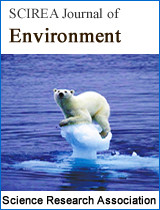Assessment of Irrigation Water Salinity and Crop Production at Botanga Irrigation Scheme
DOI: 311 Downloads 17068 Views
Author(s)
Abstract
A research was conducted at Botanga irrigation area to assess the levels of selected irrigation water quality parameters. The parameters considered were pH, electrical conductivity (ECw), total dissolved solids (TDS), calcium (Ca), magnesium (Mg), sodium (Na), sodium adsorption ratio (SAR) and bicarbonate (HCO3-). Water samples were collected from the dam, main canal and laterals for analysis. The results showed that all the selected irrigation water quality parameters were found with the maximum allowable limit, and the value of HCO3- was low to precipitate CaCO3 in the water thereby increasing the value of Na and SAR. The water was therefore suitable for irrigation.
Keywords
Irrigation, water quality, Botanga, salinity, crop production
Cite this paper
Adams Sadick, Richard Amfo-Otu, Emmanuel Dugan, Calys-Tagoe Edward,
Assessment of Irrigation Water Salinity and Crop Production at Botanga Irrigation Scheme
, SCIREA Journal of Environment.
Volume 2, Issue 2, April 2017 | PP. 30`-37.
References
| [ 1 ] | Abdul-Ganiyu, S., Amaanatu M. K. and Korese, J. K (2012). Water use efficiency and productivity for rice (Oryza Sativa) in the Botanga irrigation scheme of northern region of Ghana. Agricultural Science Research Journal. 2(7): 362–368. |
| [ 2 ] | Adams S., Issaka R. N., Quansah G. W., Amfo-Otu R. and Bagna S (2014). Assessment of irrigation water quality of Tono Dam in Navrongo, Ghana. Journal of Biodiversity and Environmental Sciences (JBES). Vol. 4, No. 3, p. 187-195, |
| [ 3 ] | Alagbe, S. A (2006). Preliminary evaluation of hydrochemistry of the Kalambaina formation, Sokoto Basin, Nigeria, Environmental Geology. 51, 39-45. |
| [ 4 ] | Ayres, R. S., Westcot D.W (1985). Water Quality for Agriculture. Irrigation and Drainage Paper No. 29. Food and Agriculture Organization of the United Nations, Rome p. 1-117. |
| [ 5 ] | De A. K (1989). Environmental Chemistry. Wiley Eastern Limited, New Delhi, India. 42-43 p. |
| [ 6 ] | Gupta P. K (2005). Methods in Environmental Analysis: Water, Soil and Air. Agrobios, Jodhpur, India ; pp. 1-127. |
| [ 7 ] | Jackson M. L (1967). Soil Chemical Analysis. Prentic Hall Inc. Englewood Cliffs, NJ, USA 1967; 227-267 p. |
| [ 8 ] | Page A. L., Miller R. H and Keeney D. R (1982). Methods of Soil Analysis (ed.), Part 2, Am. Soc. Agron - Soil Sci. Sc. Am. Madison. Wis. US, 159-446 p. |
| [ 9 ] | Rahman T. M, Rahman S. H and Majumder R. K (2012). Groundwater quality for irrigation of deep aquifer in southwestern zone of Bangladesh. Songklarakerin Journal of Science and Technology, 34(3), pp.345-352. |
| [ 10 ] | Rao N. S (2005). Seasonal variation of groundwater quality in a part of Guntur district, Andhra Pradesh, India. Environmental Geology, 49, pp.413–429. |
| [ 11 ] | Richards L. A (1954). Diagnosis and improvement of saline and alkali soils. U.S. Department of Agricultural Handbook, Washington D. C., USA, 60, pp. 160. |
| [ 12 ] | Sadick, A., Ansah, I. O., Owusu A. B. Nketia K. A., Asamoah E., Asaana J. and Amfo-Otu R (2014). Estimation of Potential Evapotranspiration at Botanga Irrigation Scheme in the Northern Region of Ghana. Environmental Research, Engineering and Management, 4(70): 5–13. http://dx.doi.org/10.5755/j01.erem.70.4.7752 |
| [ 13 ] | Todd D. K (1980). Ground Water Hydrology. 2nd ed., John Wiley and Sons Inc. New York, USA. 10-138. 14 p. |
| [ 14 ] | UCCC (University of California Committee of Consultants) (1974). Guidelines for Interpretations of water Quality for Irrigation. Technical Bulletin, University of California Committee of Consultants, California, USA, 20-28 p. |
| [ 15 ] | WHO (World Health Organization) (2004). Guideline for drinking water quality recommendations. World Health Organization, Geneva, Switzerland. |

